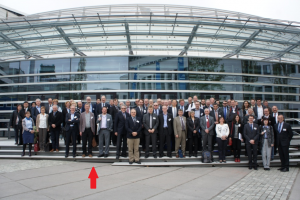Blog by Perry den Brok, Eindhoven University of Technology
Universities of Technology are currently facing a range of developments with respect to their education. For example, interdisciplinary engineering research and education are gaining momentum. Yet, teachers and researchers are struggling with the boundaries that are created by departments and faculties, and current metrics for performance do not appraise interdisciplinary work. Also, universities are being confronted with large increases in their student population, both in terms of numbers as well as variety, cultural, motivational or other. Technology is picked up for the support and deliverance of courses and assesment; blended approaches or MOOCs are common phenomena.
Deans of engineering faculties accross Europe discussed these themes during their annual ECED (European Convention of Engineering Deans) meeting in Munich on April 3 and 4, 2017. The meeting was hosted by the Technische Universitӓt München and co-convened by CESAER (the Conference of European Schools for Advanced engineering Education and Research) and SEFI (the European Society for Engineering Education).
During the convention, the deans discussed three major topics, namely research, education and governance. The first topic mainly dealt with how to support and appraise research that engages in interdisciplinary engineering research in a reality in which metrics and other rewards are mainly gained via disciplinary systems. The last topic dealt with the type of leadership that is needed in universities to support new streams of research and innovations in education, especially in an age of uncertainty. Although important and interesting, given the nature of 4TU.CEE to focus on innovations in engineering education, most attention will be directed here to the topic of education. Interesting youtube contributions from participating deans about research and education can be found at the ECED 2017 website.

Participants of ECED 2017 (Aldert Kamp and Perry den Brok from 4TU.CEE are on the left and front of the picture – see the red arrow).
Topics
A question that comes to mind is what topics or themes emerge accross universities of technology in Europe. What developments are occuring and what type of initiatives are universities taking? From the various speakers and contributions to ECED, the following topics came to the fore:
- More and more interdiciplinary courses or curricula are being developed, often preceded by interdisciplinary research projects or groups. Interesting challenges that teachers in such contexts face are how to integrate different topics or domains, how to motivate students from different domains, and how to assess interdisciplinary tasks with teachers that are often experts in one domain. This topic is also being recognised by 4TU.CEE as an important theme and much research effort is being invested in it.
- There is more and more emphasis on the fact that a variety of engineers is being educated, with different types of profiles, such as the technological oriented engineer, the societal oriented engineer, or the entrepeneurial engineer.
- Many universities are struggling with how to integrate skills into their curricula. Such skills include more general 21st century skills such as intercultural communication or collaboration, but also more engineering specific skills, such as problem solving or creative and design thinking.
- Many universities are experimenting with so-called maker-spaces, in which students can work on real-life, complex and interdisciplinary projects that interweave learning, research and innovation. More in general, a trend can be seen towards more student oriented education, with more emphasis on deep learning, opportunities for choice for students, and student-centred teaching methods. Examples of maker spaces can be found at Aalborg and other Scandinavian universities. But 4TU.CEE also encountered a nice example at EPFL during their last study trip.
- Universities are more and more concerned about providing students during their curricula with experiences in which they collaborate with companies or in which they learn from alumni. Such experiences may involve outreach, but also deal with guest visits or lectures, internships, or even specific professional development programmes.
Finally, some interesting observations were made by the two 4TU.CEE members that participated in the meeting (den Brok and Kamp). First, the question was raised as to whether universities would still exist in 2040, if they continue with their current education and rate of change. More and more examples are visible in which students obtain certificates and degrees via alternative programmes and are being accepted by companies. Universities thus have to think seriously about their added value, in particular in terms of the on-campus experiences they are able to provide. Second, it was mentioned that students are often a driver for change, and should be acknowledged as such. Much can be learned from their input on education.
A taskforce will be created by CESAER in order to formulate a vision on Engineering Education for the future, that will also be shared with the European Union. 4TU.CEE will participate actively in this taskforce. This will materialise in a first meeting of the taskforce, to be held in Eindhoven on May 12, 2017. To be continued!




